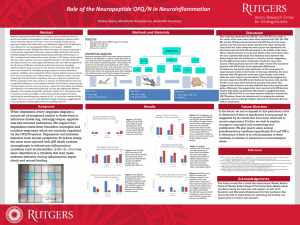Payne, Paisley: Role of the Neuropeptide OFQ/N in Neuroinflammation
Title: Role of the Neuropeptide OFQ/N in Neuroinflammation
Name: Paisley Payne
Major: Biological Sciences and Psychology
School affiliation: Honors College, School of Arts and Sciences
Programs: Honors College Capstone, PNI Lab
Other contributors: Dr. Kusnecov and Marialaina
Abstract: Bacterial lipopolysaccharide (LPS) is an endotoxin that activates the immunesystem and enables macrophages to release proinflammatory cytokines which induce stress-like effects in the brain. In the current study, the goal was to determine whether the inflammatory and behavioral response to LPS differed in mice deficient for the neuropeptide OFQ/N, or its receptor, NOP/ORL. OrphaninFQ/nociceptin (OFQ/N) has several functions, and may be important in containing the magnitude of the stress response. Male and female mice with a C57/BL6 background were grouped by genotype (wild-type, OFQ knockout, or ORL-1 knockout) and treated with an acute injection of LPS (5ug) or saline control. Two hours after injection, mice were tested for behavior in the open field (OF) and responsiveness to a novel object (OF/NO test). One hour after completion of the 10 minute OF/NO test, animals were perfused and brains and spleen collected. Spleens were measured for the cytokine interleukin-1β (IL-1β), while brains were assayed for immediate early gene expression (data collection in progress). Wildtype mice responded to LPS by showing delayed entrance into the inner zone surrounding a novel object stimulus. The response of ORL-1 KO mice treated with LPS also showed a significant decrease in distance travelled in the NO/OF, compared to the saline control. In contrast, for OFQ knockouts there was no significant difference in travel distance between LPS and Saline-treated groups. However, latency to enter the inner zone (i.e. where the novel object was located) was highest for LPS treated OFQ knockouts, and was also significantly different between LPS and saline-treated ORL knockouts. Finally, the IL-1β cytokine levels in knockout animals were higher in LPS treated animals compared to saline, confirming the proinflammatory response to LPS. In conclusion, deletion of ORL-1 receptor seems to cause the most significant change in behavior, suggesting that it has a protective function against immune challenge with LPS.
